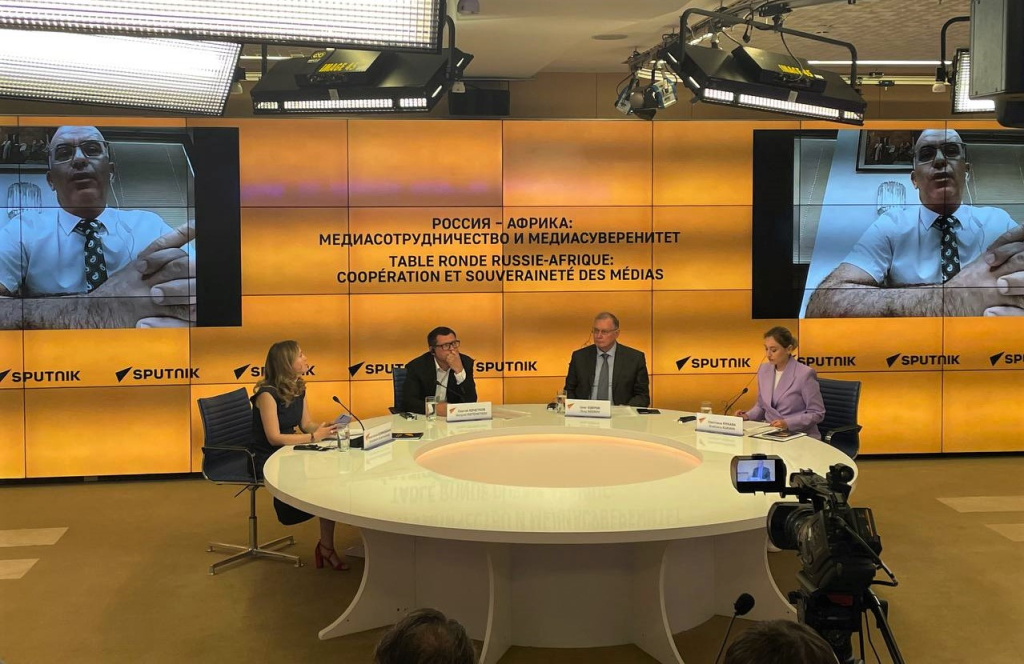Photo credit: Vitaly Belousov, Sputnik
Sputnik International Multimedia Press Center in Moscow hosted a
roundtable discussion on Russia-Africa: Media Cooperation and Media Sovereignty.
The discussion was attended by Sergei Kochetkov, First Deputy Editor-in-Chief of the Rossiya Segodnya International Media Group; Oleg Ozerov, Ambassador-at-Large of the Russian Foreign Ministry, Head of the Russia-Africa Partnership Forum Secretariat; and Svetlana Kukava, observer of the international TV BRICS network. Director General of the TAP News Agency (Tunisia) Najesh Missaoui; Roland Lumumba, son of Patrice Lumumba, national hero of the Democratic Republic of the Congo, and President of the Patrice Lumumba Foundation; Hassane Baba Diombele, Director General of the Radio and Television Office of Mali (ORTM); and Eric Ndongo, Director of Radio bonne nouvelle (Cameroon), joined the discussion online.
During the dialogue on Russia-Africa cooperation focused on training highly qualified personnel, Oleg Ozerov, Ambassador-at-Large of the Russian Foreign Ministry, Head of the Russia-Africa Partnership Forum Secretariat, announced the participants of the roundtable discussion on the completion of the legal procedure for returning the name of Patrice Lumumba, national hero and first prime minister of the Democratic Republic of the Congo, to the Peoples’ Friendship University of Russia (RUDN University). “We restored historical justice. This is an important symbolic gesture, an indicator that Russia is turning its face towards Africa. Russia remembers the heroes of Africa and fighters for national liberation. Not just Patrice Lumumba, but also Nelson Mandela, and Kwame Nkrumah, and Leopold Sedar Senghor, and many others. Samora Machel, Ahmed Ben Bella, Gamal Abdel Nasser and all those who fought for national liberation, sometimes at the cost of their lives.”
In response, the son of Patrice Lumumba, Roland Lumumba, welcomed this decision. “I am overwhelmed with pride that the name of my father was returned to RUDN University in Moscow. He was a spokesman in the struggle for progress in Africa in the early years of African independence. He was a martyr among the African leaders of his time. I have met people all over the world who told me that they graduated from Patrice Lumumba University in Moscow. This has always moved me."
Speaking about work in the African field of work, Sergei Kochetkov, First Deputy Editor-in-Chief of the Rossiya Segodnya media group, noted:“A year ago, we launched a French-language website targeting African audience: Sputnik Afrique. During the year, it has shown very positive results: a significant increase in the number of unique visitors, and the audience is growing steadily.”The media manager talked about plans to expand Sputnik’s radio broadcasting in French and English, the agency joining the African Broadcasting Union as an associate member, the development of the SputnikPro project in Africa, and the amplification of the Sputnik partner network in Africa through content sharing partnership agreements.
Director General of the Tunisian TAP News Agency Najesh Missaoui supported the need to develop Russia-Africa relations based on the principles of equality and justice: “The horizons of peace and international cooperation are still open, and cooperation between Russia and the African countries prove this. We hope this will become a model for establishing fair, equal and mutually enriching international relations.”
Hassane Baba Diombele, Director General of the Radio and Television Office of Mali (ORTM), noted the direct connection between high-quality unbiased news content and protecting a country’s sovereignty: “Today we are trying to expand our capabilities in the field of processing news information coming from a variety of sources in order to be able to defend our national independence with the means that we have, together with our entire state and society. And our main tool is truthful information.”
Emphasizing the importance of spreading information in today’s world, Eric Ndongo, Director of Radio bonne nouvelle, noted, “The African people want to know more; they want to know what is happening in Russia, China and other countries, because it has a direct impact on the life of the continent.”
Svetlana Kukava, TV BRICS observer, focused on the role of BRICS in promoting international dialogue, “The agenda is expanding; world leaders and international media are highlighting BRICS’ enormous potential. It is important to note that the BRICS agenda is focused on addressing international development issues that unite absolutely all of its participants. Members of our international TV BRICS network are taking constructive unifying initiatives aimed at finding joint answers to the most current questions.”
The roundtable discussion, attended by top media managers from African countries, took place ahead of the Russia-Africa summit, which will be held on July 27-28 in St. Petersburg.
Patrice Lumumba Peoples' Friendship University of Russia (RUDN) – one of best Russia’s universities. University was founded in 1960. RUDN University offers large variety of specializations, 6 faculties, 10 institutes, academy and higher school provide ample opportunities for getting quality education. RUDN University has over 200 laboratories, more than 40 scientific research and educational centers with modern equipment, annual scientific conferences, scholarships, researches of federal and global scale. RUDN University unites representatives of 160 countries of the world, 500 nationalities. RUDN campus is a city in the city: academic and housing buildings, sport facilities and several stadiums, a clinic, a culture centre on the territory of 50 hectares.








